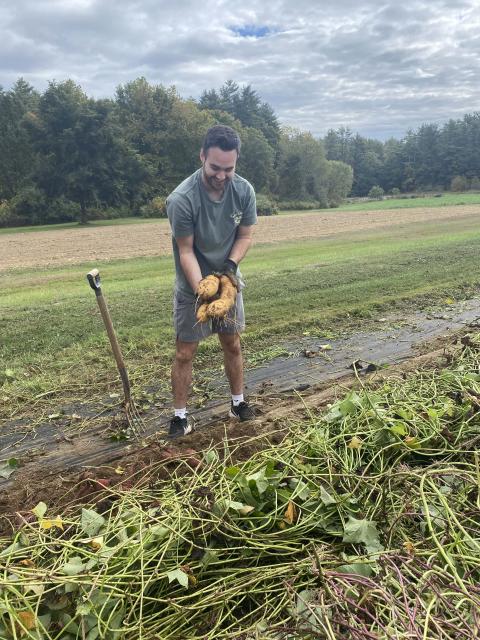
Braden Foulks ’25 is a biochemistry, molecular and cellular biology major and a sustainable agriculture minor who has been working with Professor Becky Sideman and Professor Iago Hale on their respective research, which is funded by the New Hampshire Agricultural Experiment Station at UNH.
COLSA: Tell us about your research in as non-technical language as possible.
Braden: For Dr. Sideman, I’m helping to evaluate varieties and growing methods for tomatoes, figs, radicchio and sweetpotato.
Dr. Hale is breeding kiwiberry vines for better fruit quality and maximum fruit yield. Kiwiberries are an underutilized crop especially adapted to New England climate. My job is to collect and test the fruit to see if a vine was produced to have low oxalate and favorable traits.
COLSA: What challenge does your research seek to address?
Braden: For tomatoes, we’re looking at which method of growing tomatoes is the most efficient and productive. For figs, we’re working to determine- the best way to winter fig trees in a New England climate. For radicchio, we’re evaluating the varieties for marketability and head weight and why certain heads weren’t marketable. We’re also working to identify the best time of year to plant. For sweetpotato, we’re evaluating the varieties for marketability and weight, and what makes certain sweetpotatoes unmarketable.
Oxalate is a chemical naturally produced by some plants — including kiwiberries — to aid in fruit ripening. It is unpalatable and leaves a weird texture in your mouth if you consume enough of it. Dr. Hale is breeding vines with favorable fruit traits with vines that had low oxalate.
COLSA: Your work elevates research supported by the NH Agricultural Experiment Station. How will it benefit people, communities and/or the natural environment in New Hampshire?
Braden: The work with Dr. Sideman directly benefits farmers, offering knowledge on the most productive methods of growing food, best times to plant, which varieties are the most marketable, and for breeders, why some varieties weren’t marketable. We also donate most of the food we grow.
Dr. Hale is working to provide local farmers with his advanced lines of vines that produce a lot of berries that taste very good. He aims to introduce this underutilized and tasty fruit into the American diet.
COLSA: What are you learning as a result of you experience?
Braden: I’m learning how to set up and run agricultural experiments, how to maintain these experiments, how to best care for these various crops we are growing and how to work on a farm. I’m also learning the value of delayed gratification and hard work.
COLSA: Who are you working with? (Faculty, grad students, other undergrads)
Braden: Dr. Iago Hale, Dr. Becky Sideman, Lilly Hartman, Sharon MacDougall
COLSA: What should prospective students know about UNH?
Braden: It is an accepting, exciting place to live and learn. The faculty work to help students fulfill their potential. It really prepares you for after college.
COLSA: What do you love most about UNH?
Braden: I love how much fun you can have. I met all my best friends here and UNH has allowed us to become very close over the years.
The NH Agricultural Experiment Station helps improve New Hampshire's lives, livelihoods and landscapes through research and discoveries that sustain agricultural, food and forested ecosystems and supporting the development of future scientists. The Station research described above is based on work with joint funding from the USDA National Institute of Food and Agriculture under Hatch award numbers 7003420 and 7005933 and the state of New Hampshire.